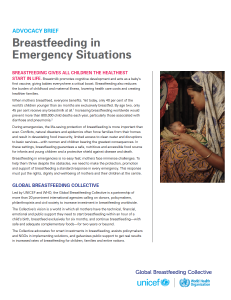
BREASTFEEDING GIVES ALL CHILDREN THE HEALTHIEST START IN LIFE. Breastmilk promotes cognitive development and acts as a baby’s first vaccine, giving babies everywhere a critical boost. Breastfeeding also reduces the burden of childhood and maternal illness, lowering health care costs and creating healthier families.
When mothers breastfeed, everyone benefits. Yet today, only 40 per cent of the world’s children younger than six months are exclusively breastfed. By age two, only 45 per cent receive any breastmilk at all.1 Increasing breastfeeding worldwide would prevent more than 800,000 child deaths each year, particularly those associated with diarrhoea and pneumonia.2
During emergencies, the life-saving protection of breastfeeding is more important than ever. Conflicts, natural disasters and epidemics often force families from their homes and result in devastating food insecurity, limited access to clean water and disruptions to basic services—with women and children bearing the greatest consequences. In these settings, breastfeeding guarantees a safe, nutritious and accessible food source for infants and young children and a protective shield against disease and death.
Breastfeeding in emergencies is no easy feat; mothers face immense challenges. To help them thrive despite the obstacles, we need to make the protection, promotion and support of breastfeeding a standard response in every emergency. This response must put the rights, dignity and well-being of mothers and their children at the centre.
GLOBAL BREASTFEEDING COLLECTIVE
Led by UNICEF and WHO, the Global Breastfeeding Collective is a partnership of more than 20 prominent international agencies calling on donors, policymakers, philanthropists and civil society to increase investment in breastfeeding worldwide.
The Collective’s vision is a world in which all mothers have the technical, financial, emotional and public support they need to start breastfeeding within an hour of a child’s birth, breastfeed exclusively for six months, and continue breastfeeding—with safe and adequate complementary foods—for two years or beyond.
The Collective advocates for smart investments in breastfeeding, assists policymakers and NGOs in implementing solutions, and galvanizes public support to get real results in increased rates of breastfeeding for children, families and entire nations.